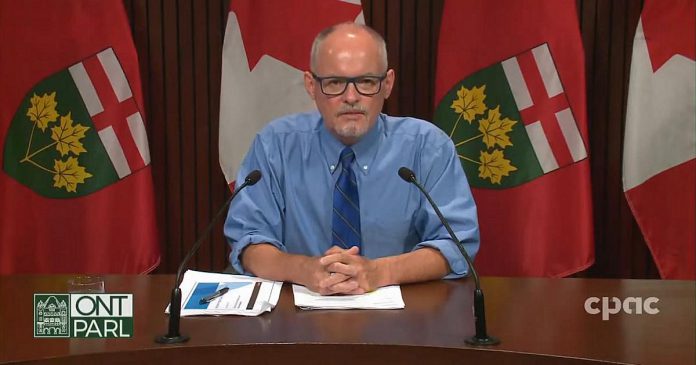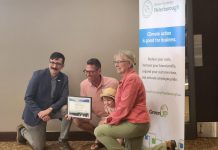
With the COVID-19 delta variant driving a fourth wave of the pandemic in Ontario, the provincial government is making vaccination policies mandatory for all high-risk settings — including hospitals, ambulance services, and home and community service providers — no later than September 7.
The government will also be requiring the same for all colleges and universities, retirement homes, women’s shelters, and congregate group homes and day programs for children and vulnerable adults.
Dr. Kieran Moore, Ontario’s chief medical officer of health, announced the directive on Tuesday (August 17).
“For the last several weeks, I have been unwavering in my pleas for all eligible Ontarians to step up, roll up their sleeves, and get vaccinated,” Dr. Moore said. “I said time is of the essence, but now that time is here. We must take assertive action to protect the health and safety of all Ontarians, especially as we move closer to a return to school and the cooler weather drives us indoors.”
At a minimum, the vaccination policies will require employees, staff, contractors, students and volunteers in high-risk settings to provide either proof of full vaccination against COVID-19, a medical reason for not being vaccinated against COVID-19, or completion of a educational session about the benefits and risks of COVID-19 vaccination. In addition, those who do not provide proof of full vaccination will be required to undergo regular testing and demonstrate continued negative results.
“The delta variant is more transmissible, and has resulted in a reintroduction of COVID-19 in some high-risk settings,” Dr. Moore said. “These are settings where individuals are at a higher risk due to age or their health conditions or co-morbidities and we need to better protect them.”
Dr. Moore said that organizations will have the authority to implement more stringent COVID-19 vaccination policies above the minimum requirements if they choose to do so.
For employees of publicly funded school boards, staff in private schools, and staff in licensed child care settings, the Ministry of Education will introduce a vaccination disclosure policy that will require rapid antigen testing requirements for staff who are not immunized against COVID-19.
The province will also require vaccination policies to be implemented in post-secondary institutions, licensed retirement homes, women’s shelters, and congregate group homes and day programs for adults with developmental disabilities, children’s treatment centres and other services for children with special needs, and licensed children’s residential settings.
Ontario will also begin offering third doses of the COVID-19 vaccine to those at highest risk from the delta variant, including transplant recipients, cancer patients undergoing treatment, recipients of an anti-CD20 agent (used to treat diseases such as non-Hodgkin’s lymphoma and leukemia), and residents of high-risk congregate care settings including long-term care homes, higher-risk licensed retirement homes, and First Nations elder care lodges.
Effective Wednesday (August 18), the province is also extending eligibility to receive the Pfizer vaccine to children who are 11 years old and turn 12 before the end of the year. Appointments can be made through the provincial booking system, through public health units, or at pharmacies or walk-in vaccination clinics.
While 81 per cent of eligible Ontarians have received the first dose of a COVID-19 vaccine, another 400,000 Ontarians need to be vaccinated before Ontario reaches its target of having 75 per cent of the eligible population fully vaccinated.
While the government says it expects to reach the 75 per cent target in August, Dr. Moore also announced Ontario will be staying in step three of the province’s reopening plan until further notice “out of an abundance of caution.”
When asked by a reporter while the province waited this long to implement these directives, Dr. Moore said the decision was made due to lower-than-expected vaccination rates.
“We had a sudden drop-off over the last several weeks and, quite honestly, we have to rebolster our efforts to immunize Ontarians,” he said. “It was unexpected to have such a sudden drop-off, and we’ve learned more about the threat of delta. It is now over 90 per cent of the detected samples in Ontario, and we are now seeing our rates of illness go up and we’re seeing our hospitalization numbers go up.”


























